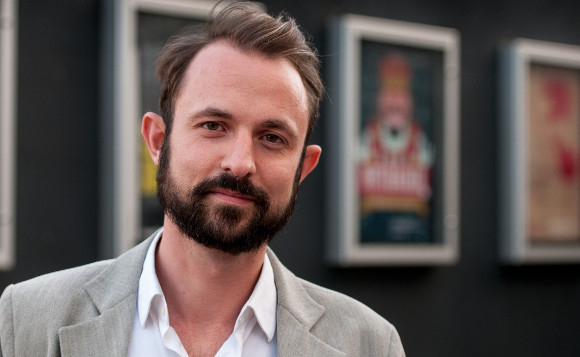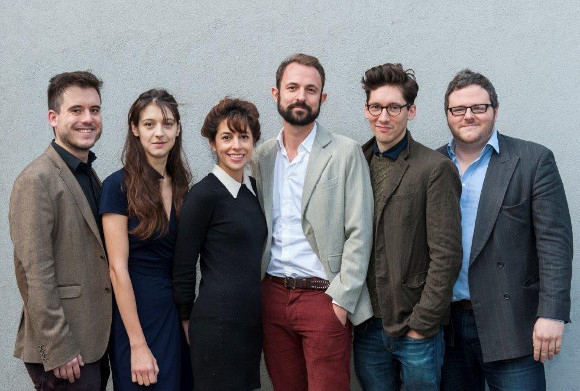Changing of the guard… Sam Hodges at the Nuffield Southampton: 'I want us to be a venue that people talk about'
After establishing the HighTide new writing festival and spending two years as a producer at the West End’s Criterion Theatre, Sam Hodges recently took over as the created creative and executive director of the Nuffield Theatre, Southampton

How did you start working in theatre?
I started out acting, as so many people working in theatre do. I think I got into it initially because my grandfather was big into amateur dramatics; one of my earliest theatrical experiences was seeing him play Tevye in Fiddler on the Roof at the Citadel in Plymouth, where I grew up. I was part of the Plymouth youth theatre company, then carried on performing while at Cambridge, where I got a chance to try out some directing and producing. After graduating it felt like quite a natural thing to set up HighTide, and through that process I discovered I enjoyed the management side of theatre just as much as the creative side.
What do you consider your proudest professional achievement to date?
Setting up HighTide was a wonderful five years that took me in lots of directions I could never have predicted at the outset. Looking back at some of the writers and directors we worked with early on – Nick Payne, Mike Longhurst, Polly Findlay, Sam Holcroft – and seeing how their careers have flourished since, is something I take huge satisfaction from, and it's great to be working with them still.
What was it about the Nuffield job that appealed to you?
A few things. When I first came to visit I just fell in love with the space. It has so much potential. I also saw that there was a job to be done; there was a challenge, for various reasons, in terms of taking the theatre in a new direction and opening things up. The Nuffield has done wonderful things over the years but I think over the time that Patrick [Sandford] ran the venue the theatre landscape has changed. For example the reality of an artistic director directing the vast majority of work in a theatre is almost impractical now. I relished that challenge, and I felt that having developed certain relationships during my time at HighTide, and having spent a couple of years learning about commercial theatre and the West End, I was well placed to build a national profile for the organisation. It's a 500-seat space only an hour from London and I felt there was a huge opportunity both to create a dialogue with London and to fully integrate what we're doing with the city of Southampton.
How do you define your role?
It's the combined role of an artistic director and executive director. That was the board's vision, to have one person who is accountable and, more fundamentally, find someone who's natural inclination was to reach out into the industry and find a new generation of artists to work here. It's similar to the role that Erica Whyman had a Northern Stage.
What do you identify as your immediate challenges?
I think the biggest challenge is to rebuild our audience, in the context of trying to build and maintain a high quality body of work. In the last ten years the theatre has presented as much if not more work than it's produced, which makes it hard to forge an artistic identity. I need to make that identity clear and communicate it to our audience, so that trust gets rebuilt and people are willing to take a punt on new work. It's a challenge because I'm replacing someone with whom Southampton has had a working relationship for a quarter of a century.
What do you think of the theatre's location on the university campus?
A few months ago I would've said that was a challenge, but I almost feel the opposite now. The relationship with the university is terrific and I think there are some really exciting things emerging regarding how we can work together. And not just in terms of getting students into the shows, but also working much more closely with the various departments on the stories we tell. That being said, our location on a university campus probably doesn't help in terms of the impression that a lot of people have that theatre is an elitist artform, so that's something we'll have to navigate quite carefully.

How would you summarise your overriding vision for the Nuffield?
Undoubtedly I feel very ambitious for the theatre, and in the next five years I want it to be considered one of the leading producing venues in the country, alongside the likes of Sheffield and Bristol. I want it to the kind of place that talented theatremakers – like my five associates (see picture) – want to work. In terms of the work itself there's a need to rebuild trust, so there need to be a few well-known 'titles', but done in an original way – for example in the first season we're taking a fresh look at Noel Coward with Tonight at 8.30. And I also want to examine how community work fits in with what we do. We'll be making work in the city centre as well as our base. Fundamentally, I want us to be a venue that people talk about.
How will you measure your success?
A key thing will be audience numbers, and as part of that where the audience is coming from, looking beyond our traditional catchments. Something else will be how widely we're being talked about, both in terms of the industry and the media. If someone reads about their local theatre in a national paper I think they're more likely to want to go. So I think it's really important we actively pursue a national presence as a local presence, if you will.
How important is it for you to transfer your work elsewhere, particularly to London?
I absolutely want to build an active dialogue with London, and on one level that's certainly about taking work in, though not necessarily to the West End. I'd also like to find a way of touring some of the mid-scale work that we do; that's really on my radar.
Where do you see yourself in ten years?
I couldn't tell you, but in my few months running the Nuffield I've discovered I love running theatres and I'd love to do more of it, possibly in London. But I love the unpredictability of this industry; a few years ago I never would've imagined I'd be working at the Nuffield. I also have a strong interest in film – my wife is a film producer – so I'd like to work more in that area as well. But for now my focus is fully in Southampton.
For more on the Nuffield Southampton and its work, visit www.nuffieldtheatre.co.uk












